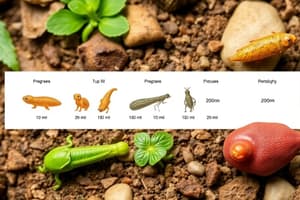Podcast
Questions and Answers
In 1735, who divided the living world into 2 kingdoms - Vegetabilia and Animalia?
In 1735, who divided the living world into 2 kingdoms - Vegetabilia and Animalia?
- Carl Linnaeus (correct)
- Robert Harding Whittaker
- Chatton
- Haeckel
Who divided living organisms into 5 groups in 1969?
Who divided living organisms into 5 groups in 1969?
- Chatton
- Robert Harding Whittaker (correct)
- Haeckel
- Carl Linnaeus
How many species of living organisms were found on Earth according to the 2011 census?
How many species of living organisms were found on Earth according to the 2011 census?
- 75 million
- 87 million (correct)
- 100 million
- 50 million
Who considered 3 kingdoms - Protista, Plants, and Animals in 1866?
Who considered 3 kingdoms - Protista, Plants, and Animals in 1866?
In what year did Chatton create two groups Prokaryotes?
In what year did Chatton create two groups Prokaryotes?
Flashcards are hidden until you start studying
Study Notes
The Two Kingdoms
- In 1735, Carl Linnaeus categorized the living world into two kingdoms: Vegetabilia (plants) and Animalia (animals).
The Five Kingdoms
- In 1969, Robert Whittaker proposed a five-kingdom system that included Monera, Protista, Fungi, Plantae, and Animalia. This classification was based on differences in cellular structure, mode of nutrition, life cycle, and other characteristics.
The 2011 Census
- The 2011 census of life found a total of 1.9 million living species on Earth.
The Three Kingdoms
- In 1866, Ernst Haeckel proposed a three-kingdom system that included Protista, Plants, and Animals. This system was based on recognizing single-celled organisms as a distinct group.
Prokaryotes
- In 1925, Édouard Chatton created two groups of organisms Prokaryotes (without a nucleus) and Eukaryotes (with a nucleus). This classification was based on the presence or absence of a true nucleus in the cells.
Studying That Suits You
Use AI to generate personalized quizzes and flashcards to suit your learning preferences.




